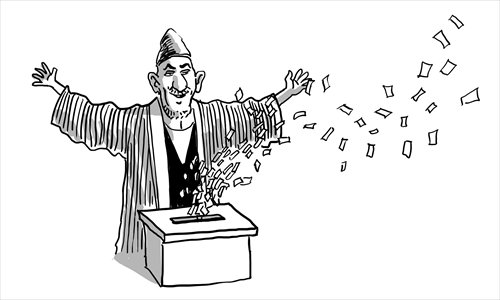Karzai shoring up his own political position

Illustration: Liu Rui/GT
Since Afghan President Hamid Karzai on November 24 refused to sign a US-Afghan Bilateral Security Agreement (BSA) that had already been approved by Afghanistan's Loya Jirga, or grand assembly, which was to keep US troops in the country after the current combat mission ends in 2014, Karzai and his government have felt pressure from the US and its NATO allies.
Karzai's Spokesman Aimal Faizi told Reuters in an e-mailed statement on December 6 that "If there is a perception in Washington that certain elements in Kabul can force President Karzai to succumb to any pressure, it is seriously flawed and mistaken." The e-mail was sent one day after Washington's top diplomat for Afghanistan and Pakistan James Dobbins visited Karzai to convince him to sign the BSA by the end of this year.
In a two-day NATO foreign ministerial meeting at NATO headquarters in Brussels on December 3-4 about the future security of Afghanistan, NATO ministers called Afghanistan to sign the security pact as soon as possible or it would effect the international community's support for Afghanistan.
For Karzai, it poses huge political risks for him to blackmail the US on the BSA, so why did he insist on doing so?
His refusal can be traced back to his requests from the US before signing the BSA. For example, Karzai hoped the US could provide long-term policy support amid the peace talks between the Afghan government and the Taliban. He demanded international coalition forces stop possible military actions on Afghan families. He also asked the US to transfer Afghan criminals detained in the Guantanamo Bay.
However, Dobbins said in Kabul that the Obama administration had refused to make any promises for the peace talks between Afghanistan and the Taliban and urged Afghanistan to sign the BSA before the talks.
Nonetheless, the domestic political pressure that Karzai and his interest groups face may constitute the main reason for Karzai's refusal. Karzai is bolstering his political leverage by betting on the future security of his country.
There are three reasons behind his move. First, the number of Afghan civilians accidentally injured by the international security forces is not as high as imagined. According to UN statistics, 74 percent of the casualties were caused by insurgents. Only because accidental casualties can easily attract attention and the normal lives of Afghans are often influenced by military actions of international security forces, the Afghan public's favorable impression toward the Americans gradually faded away.
Second, the intensifying rivalry among different political forces within Afghanistan has posed threats to Karzai and his interest groups. Besides the Taliban, pressure also comes from the political coalition of the Junbish-i-Milli Islami, Hezb-e Islami, Jamiat-e Islami and representatives from groups such as the Tajik and the Uzbek. Karzai may want to clear the way for his interest groups and win support from the US-led West before the 2014 presidential elections and 2015 parliamentary elections.
Third, Karzai knows clearly that the Obama administration also faces huge domestic pressure in terms of the Afghan issue. Every year, the US provides aid worth over $4 billion to the Afghan government, yet the Taliban has not been defeated, which makes the US feel like it is being "kidnapped" by Karzai.
However, Karzai has reasons to believe the US is unlikely to fully withdraw from his country and he will not easily give up his "blackmail." As for the US' Central Asia strategy, Afghanistan has perhaps the most strategic deterrence toward countries such as Russia, China and Iran. Without a BSA, the US can hardly achieve its "New Silk Road" scheme.
After all, it is only a matter of time before Karzai signs the BSA with the US. As the representative of Afghanistan's most long-standing and influential tribes, Karzai is only trying to consolidate his own power and that of his interest groups by making use of the BSA.
The author is an assistant research fellow at the Institute of Russian, Eastern European & Central Asian Studies of the Chinese Academy of Social Sciences. opinion@globaltimes.com.cn